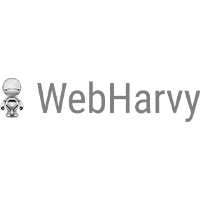What is WebHarvy Used for and How Does it Work?
WebHarvy is a powerful web scraping and data extraction tool designed to simplify the process of gathering data from websites. Whether you are a business looking to extract information for market research, a data analyst in need of structured data for analysis, or an individual interested in automating data retrieval, WebHarvy offers a comprehensive solution.
Key Features of WebHarvy:
-
Point-and-Click Interface: WebHarvy provides a user-friendly interface that allows you to navigate websites like a regular browser and select the data elements you want to extract. No coding skills are required, making it accessible to users of all levels.
-
Scraping Patterns: The software recognizes common data patterns on websites, such as product listings, contact information, and more. This pattern recognition simplifies the extraction process.
-
Data Export: WebHarvy allows you to export scraped data in various formats, including CSV, Excel, XML, and JSON. This flexibility ensures compatibility with your data analysis tools.
-
Automation: You can schedule scraping tasks to run at specific intervals, ensuring that you always have up-to-date data.
Why Do You Need a Proxy for WebHarvy?
When using WebHarvy for web scraping, especially for large-scale or frequent data extraction tasks, utilizing proxy servers becomes essential. Here’s why:
1. IP Address Rotation:
- WebHarvy sends requests to websites to fetch data. Using a single IP address for all your requests may lead to IP blocking or rate limiting by websites.
- By employing proxy servers, you can rotate your IP addresses, making it harder for websites to detect and block your scraping activities.
2. Anonymity:
- Proxies provide an additional layer of anonymity, ensuring that your scraping activities remain untraceable.
3. Geolocation:
- If you need to scrape location-specific data or access websites that are geographically restricted, proxies can help you access content from different regions.
4. Load Distribution:
- Distributing your scraping requests across multiple proxy servers helps prevent overloading a single server and ensures efficient data extraction.
Advantages of Using a Proxy with WebHarvy.
Using proxy servers in conjunction with WebHarvy offers several advantages:
1. Enhanced Reliability:
- Proxies reduce the risk of IP bans and interruptions in your data extraction tasks, ensuring a more reliable scraping experience.
2. Scalability:
- With proxies, you can scale your scraping operations, handling larger volumes of data without worrying about IP restrictions.
3. Geographical Flexibility:
- Access websites from different regions, enabling you to gather diverse datasets for analysis or research.
4. Improved Privacy:
- Proxies help protect your identity and sensitive information by masking your real IP address.
5. Faster Data Extraction:
- Distributing requests through proxies can speed up the scraping process, as you can fetch data from multiple sources simultaneously.
What are the Сons of Using Free Proxies for WebHarvy.
While free proxies may seem like an appealing choice, they come with significant drawbacks for WebHarvy users:
1. Reliability Issues:
- Free proxies are often unstable and may go offline frequently, disrupting your scraping tasks.
2. Limited Speed and Bandwidth:
- Free proxies typically offer limited speed and bandwidth, slowing down your data extraction processes.
3. Security Risks:
- Using free proxies can expose your data and activities to potential security risks, as these proxies are often less secure.
4. IP Bans:
- Many websites actively block known free proxy IP addresses, making it challenging to access the desired data.
What Are the Best Proxies for WebHarvy?
When selecting proxies for WebHarvy, consider premium proxy providers like OneProxy. Here are some key factors to look for:
| Criteria | Description |
|---|---|
| Reliability | Premium proxies offer stable and reliable connections. |
| Speed | High-speed proxies ensure efficient data extraction. |
| Geolocation | Look for proxies in locations relevant to your scraping. |
| Anonymity | Ensure the proxies offer anonymity to protect your identity. |
| Scalability | Choose providers that offer scalable proxy solutions. |
How to Configure a Proxy Server for WebHarvy?
Configuring a proxy server with WebHarvy is straightforward:
-
Select a Proxy Provider: Choose a reputable proxy provider like OneProxy.
-
Obtain Proxy Credentials: Your proxy provider will supply you with proxy IP addresses, port numbers, and authentication credentials.
-
Configure WebHarvy:
- Open WebHarvy.
- Go to “Configuration” > “Proxy Settings.”
- Enter the proxy IP address and port number provided by your proxy provider.
- Input your authentication credentials if required.
- Save the settings.
-
Start Scraping: With the proxy configured, you can start your scraping tasks with the added benefits of enhanced security and reliability.
In conclusion, WebHarvy is a versatile web scraping tool, and when used in conjunction with proxy servers, it becomes a powerful asset for extracting data from the web. By choosing premium proxies like those offered by OneProxy, you can ensure the efficiency, reliability, and security of your data extraction endeavors.













